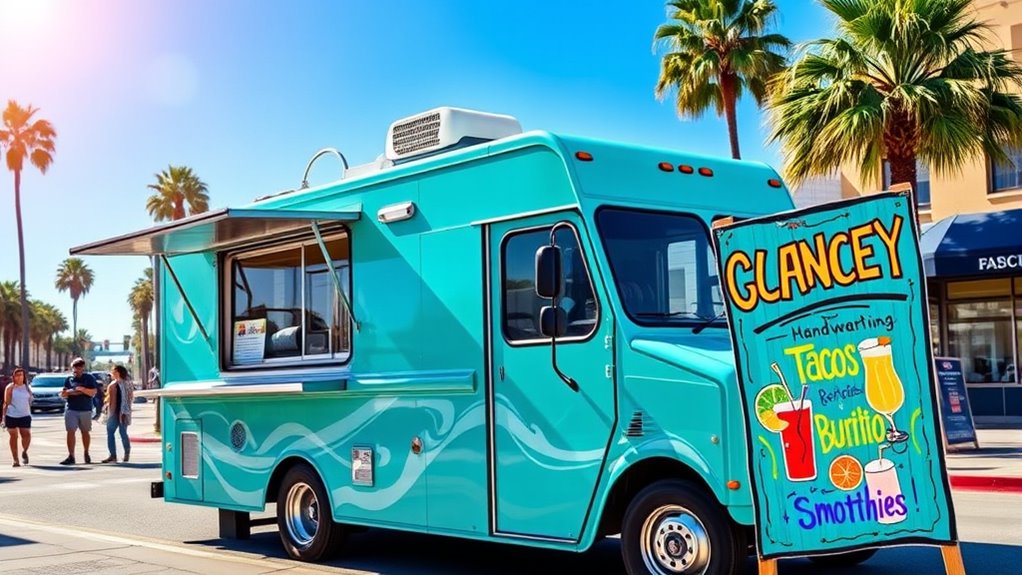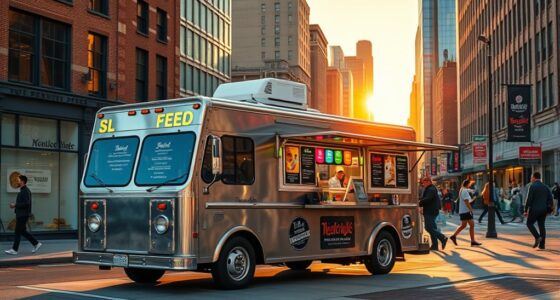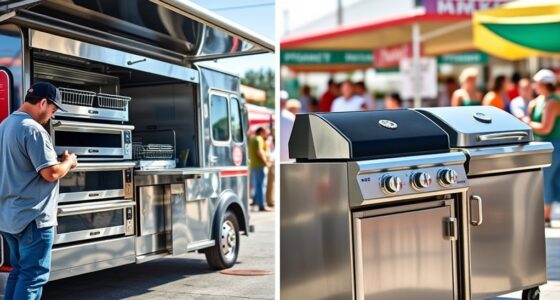To open a food truck in San Diego, you’ll need permits like a Public Health Permit, Business Tax Certificate, and possibly a mobile food truck permit. Expect startup costs between $50K and $175K, including vehicle, equipment, and permits. Be aware of zoning laws that restrict on-street parking, especially near residential areas. Craft a menu that complies with local food safety standards and use social media and partnerships to promote your business. If you keep exploring, you’ll find detailed steps to get started smoothly.
Key Takeaways
- Obtain necessary permits including a Public Health Permit, Business Tax Certificate, and city-specific mobile food truck permits.
- Startup costs range from $30,000 to over $175,000 depending on vehicle, equipment, and permit expenses.
- Focus on private property locations and avoid restricted zones; secure land use approval and ensure proper parking conditions.
- Comply with local menu regulations by sourcing ingredients from approved suppliers and clearly labeling allergens and ingredients.
- Use social media, partner with delivery services, and participate in local events to effectively market and grow your food truck business.
Navigating Permits and Licensing Requirements
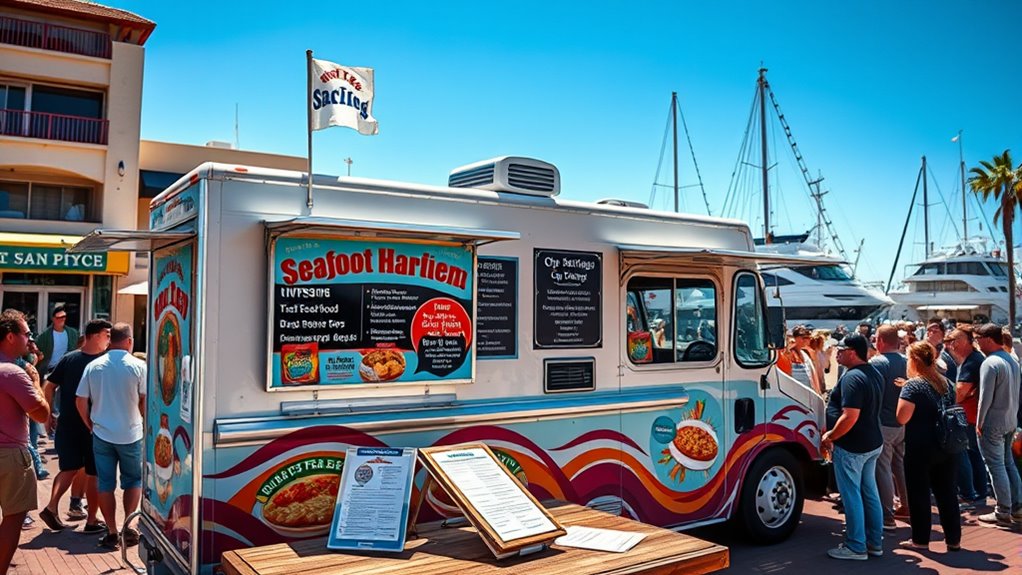
Finding your way through permits and licensing for a food truck in San Diego can seem complex, but understanding the key requirements guarantees you stay compliant. First, you’ll need a Public Health Permit from the County of San Diego Department of Environmental Health and Quality, which ensures your truck meets health and safety standards. You must submit a form (DEH:FH-152) and an Infection Prevention & Control Plan before any food prep or sales begin. Costs vary based on site complexity, and operating without this permit could cost triple the annual fee. Additionally, you’ll need a Business Tax Certificate to legally run your business within San Diego, with fees typically between $50 and $500. Finally, a Mobile Food Truck Permit from the city authorizes your specific location, and sometimes, special event permits are needed for festivals or fairs. Understanding essential oils for food safety and sanitation, such as tea tree oil’s antimicrobial properties, can also help maintain a hygienic environment in your food truck.
Estimating Startup Expenses for Food Trucks
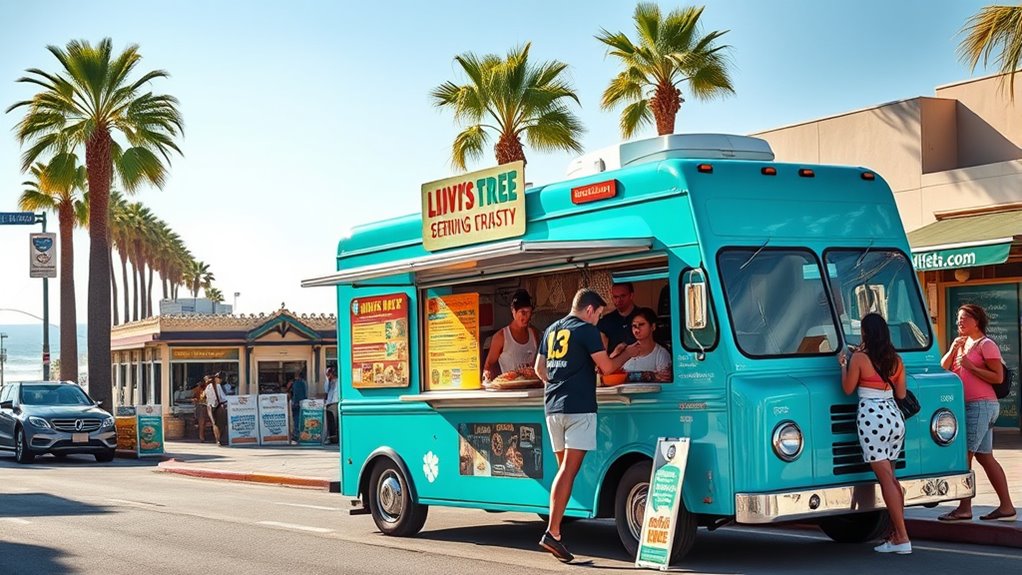
Estimating startup expenses for a food truck involves understanding the costs of purchasing and equipping your vehicle, securing necessary permits, and covering initial marketing efforts. To get a clear picture, consider these key costs:
- Vehicle and equipment: A new truck can cost $50,000–$175,000, while used options are $30,000–$70,000. Add $500–$10,000 for cooking and refrigeration gear. Initial equipment costs can vary significantly depending on the complexity of your menu and the quality of appliances chosen. It’s also important to evaluate the compatibility with existing infrastructure to ensure seamless integration.
- Permits and licenses: Expect to spend roughly $790–$1,981 for permits, plus up to $28,276 for health and food service permits.
- Startup supplies: POS systems, inventory management, and cleaning supplies can total around $2,000–$4,200 initially.
- Marketing and branding: Budget several thousand dollars for truck wraps, website setup, and promotional materials to attract customers.
Understanding Location Restrictions and Zoning Laws
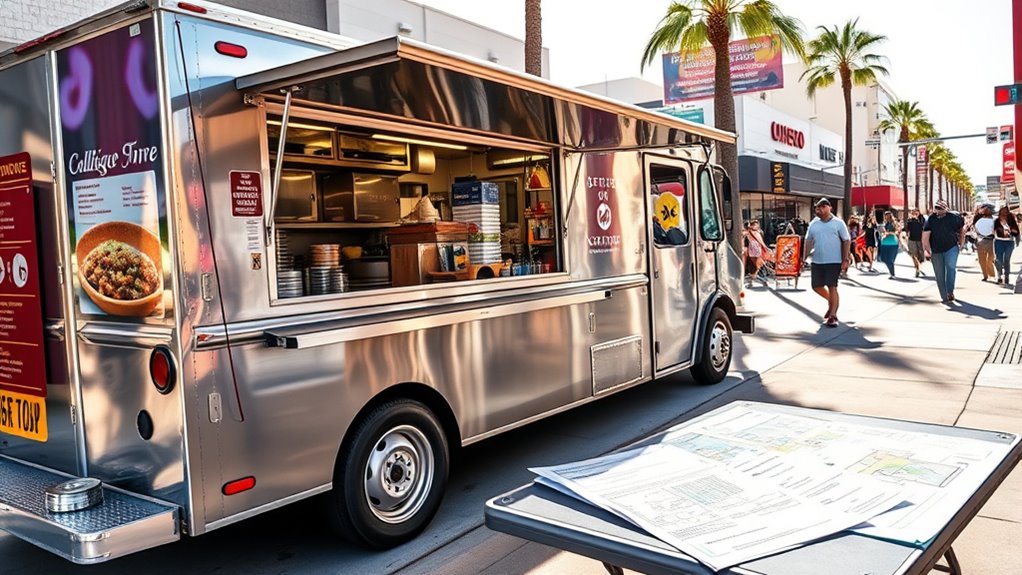
Understanding location restrictions and zoning laws is essential for operating a food truck legally and efficiently in San Diego. You’ll need to focus on private property, as most on-street vending is restricted, except at designated events. Downtown areas like Gaslamp Quarter and Little Italy may allow on-street trucks without permits, but other districts often require special authorization. Be aware of overlay zones, such as Beach or Campus areas, where vending might be prohibited. Zoning codes typically restrict trucks in residential zones, favoring commercial and mixed-use areas. You’ll need property owner approval for private sites and ensure compliance with land use rules. Additionally, trucks must be parked on paved, level surfaces, with space limits to avoid obstructing traffic or pedestrians. Minimum spacing from restaurants, other trucks, and residential zones helps prevent congestion and nuisances. Researching local ordinances and permit requirements is crucial to avoid citations and legal issues when establishing your vending location.
Crafting a Menu That Complies With Local Regulations
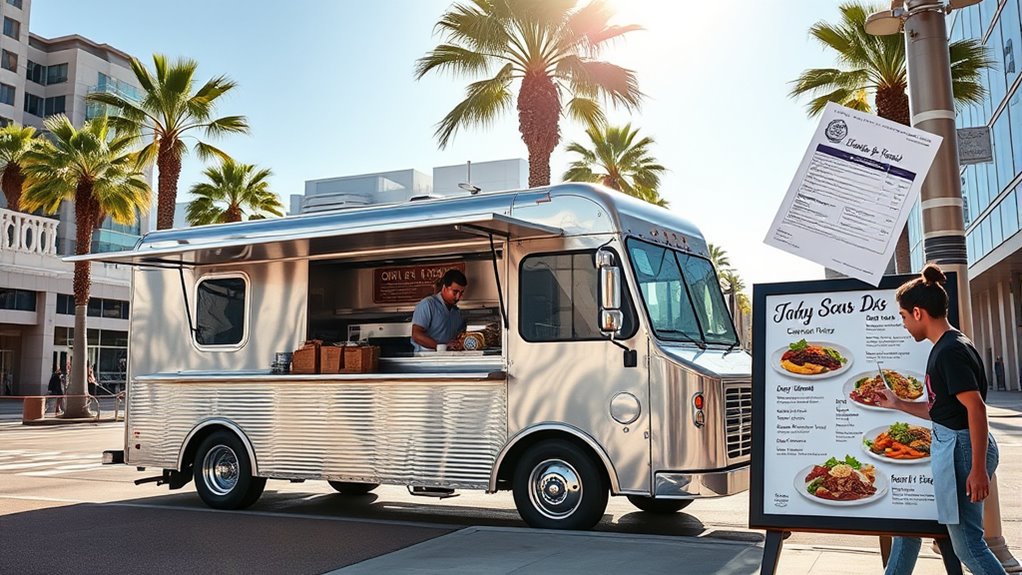
Creating a menu that aligns with local regulations is key to operating your food truck smoothly and avoiding penalties. You must guarantee all ingredients come from approved sources, with proper documentation. Your menu needs to comply with San Diego DEH standards, including safe handling, storage, and preparation within your permitted truck or commissary. Ensuring compliance with health standards is essential to prevent violations during inspections and maintain customer trust. Consider these key points: 1. Use USDA-approved meats and shellfish with proper tagging and traceability. 2. Prepare and store food only in approved facilities; private home prep is off-limits. 3. Design your menu for safe temperature control and easy health inspection compliance. 4. Clearly label menu items with ingredient, allergen, and preparation information to protect customers and meet regulations. Sticking to these guidelines keeps your menu compliant and your operation running smoothly.
Effective Marketing Strategies to Grow Your Food Truck Business
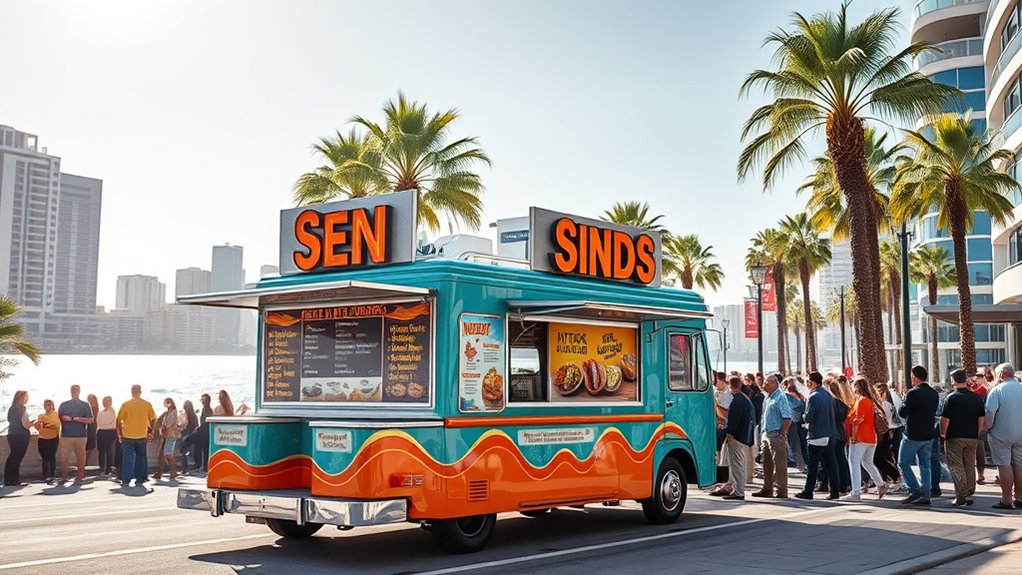
To grow your food truck business, implementing effective marketing strategies is essential for increasing visibility and attracting more customers. Leverage social media platforms like Instagram and TikTok to share appealing food photos and short videos that drive engagement and build your brand. Partnering with delivery services such as Uber Eats and DoorDash can boost sales by expanding your reach beyond physical locations. Use email marketing campaigns to promote specials, events, and location updates—these have a moderate but valuable open and click-through rate. Create branded hashtags and encourage customers to post user-generated content to increase organic reach. Hosting social media contests and participating in local festivals and collaborations also help attract new patrons and foster community loyalty.
Frequently Asked Questions
How Long Does the Permit Approval Process Typically Take in San Diego?
The permit approval process in San Diego usually takes between 4 to 8 weeks, depending on the type of permit and how complete your application is. You should plan ahead and submit all required documents early, including site plans and health inspections. Monitoring your application’s progress online and addressing any issues promptly can help prevent delays. Allow at least two months before your planned start date to guarantee smooth approval.
Are There Specific Health Regulations for Alcohol Sales on Food Trucks?
Think of health regulations as an unbreakable shield guarding your food truck. You must source beverages from approved distributors, keep alcohol sealed to prevent unauthorized sips, and display notices about open container laws. These rules act like a steady drumbeat, ensuring safety and compliance. If you follow the rhythm—strict sourcing, secure packaging, clear signage—you’ll navigate health regulations smoothly and keep your operation running without a hitch.
Can I Operate a Food Truck on Private Property Without City Permits?
You can’t operate a food truck on private property in San Diego without city permits. The municipal code generally prohibits food trucks from operating on private property unless you obtain the necessary permits, like a conditional-use permit in certain zones. Even in permitted areas, you must follow specific operational conditions, such as parking on approved, paved surfaces and meeting health and safety standards. Skipping permits risks fines and legal issues.
What Are the Insurance Requirements for Food Truck Operation in San Diego?
You need to meet specific insurance requirements to operate a food truck in San Diego. You must carry at least $1 million in general liability insurance, naming the city as an additional insured, and provide proof of coverage. Additionally, your commercial auto insurance must meet California’s minimum limits. Optional coverages like food spoilage or liquor liability can also protect your business, ensuring you’re compliant and protected from common risks.
Are There Grants or Financial Assistance Options for New Food Truck Businesses?
When it comes to grants and financial help, you’d better think outside the box. San Diego offers programs like C.H.O.P.P.E.D., providing micro-grants and training for eligible food businesses, including food trucks. The Kitchens for Good Microenterprise Program supports underrepresented entrepreneurs with startup resources. While private grants often focus on nonprofits, these city and nonprofit programs can give your new food truck a leg up, making your journey smoother.
Conclusion
Starting your food truck journey in San Diego can be a rewarding adventure, as long as you navigate the necessary permits and regulations smoothly. With careful planning and a creative approach to marketing, you’ll find your niche without too much fuss. Remember, every challenge is just a gentle nudge toward success. Keep your focus, stay adaptable, and soon your vibrant food truck will become a beloved part of the local scene.
